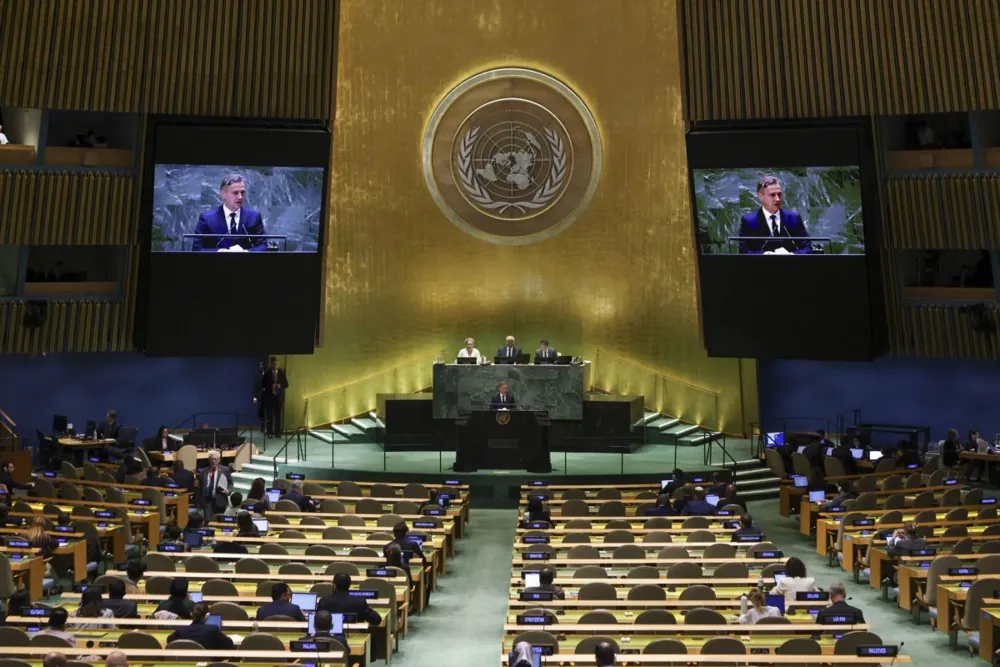“Slovenia is rapidly declining and losing credibility as a member of the European Union and an ally of the United Nations,” former Slovenian Ambassador to the US, Tone Kajzer, commented, among others, on the Prime Minister’s recent performance at the UN. The influential Visegrad24 web portal published a video of Robert Golob shouting at the UN General Assembly in New York on the X network, which casts a rather bad light on Slovenia’s reputation.
The former Slovenian ambassador to the US, Tone Kajzer, commented critically on Prime Minister Robert Golob‘s appearance at the UN General Assembly, where, during his speech, he literally shouted at Israeli Prime Minister Benjamin Netanyahu to end the war.
The Visegrad24 web portal published a video of Golob’s behaviour and described Slovenia as a far-left and anti-Israel country. Kaiser expressed concern and a need for assurance about Slovenia’s credibility as a European Union member and UN ally, and the presence of Golob’s female companion raised many questions. As Kajzer’s comment was harsh and, above all worrying, we turned to him for a slightly more extended explanation, also for those who would argue that Slovenia is not the only one that has called for a ceasefire – in fact, foreign media claim that the US, France, the UK and some others have also called for a three-week ceasefire.
In light of this, Kajzer confirmed that the task of the UN Security Council, which Slovenia chaired in September, “is to ensure peace and security – however, responsible and credible foreign policy and diplomacy, especially from Slovenia, which holds the presidency of the UN Security Council, is expected there – the countries and their representatives are expected to act calmly and impartially in order to find a solution to stop the war, as well as a long-term solution, which is, of course, not yet in sight in the current situation.”
“Loudly calling for only one side (Israel) from the UN Security Council’s rostrum and theatrically banging on the lectern will, therefore, certainly not contribute to a solution, but will likely achieve the opposite. Many interlocutors in international diplomatic circles naturally wonder why Slovenia, as a member of the EU, is not acting or trying to act in a more integrative and less activist way, as it is thus losing its credibility.”
When asked why Netanyahu is not responding to the countries’ appeals, Kajzer said that such questions are “hypocritical and based on a narrative that blames Israel for the situation. It is necessary to look objectively at who initiated the conflict by attacking Israel with terrorists and who bears the greatest responsibility here. It is also useful to look at the bigger geopolitical picture and ask who benefits most from the escalation of the conflict in the Middle East.” In his words, it is clear that “this is diverting attention from the situation in Ukraine, while Iran is pursuing its interests by obstructing the peace process between the Arab states in Israel.”
The situation in the Middle East is very complex
The situation in the Middle East is extremely complex, says Kajzer. “Following last year’s brutal terrorist attack by Hamas, which acts as an extension of Iran, Israel was also attacked from Lebanon by the terrorist organisation Hezbollah,” he explained, adding that “experts and internationally renowned analysts in the field of international relations have assessed that this was a coordinated action to divert Israel’s attention and to relieve the pressure on the Gaza front, where Israel launched a military operation against Hamas. This is, of course, an extremely complex situation in which Israel, the only functioning democracy in the region, is, of course, entitled to defend itself in accordance with international law.”
We will go down in history as a partisan non-permanent member
“We will also go down in history as an extremely partisan non-permanent member of the United Nations Security Council. The applause and silly laughter of the members of the Slovenian delegation shows a lack of maturity in mandate and responsibility,” concluded Kajzer. To recap: during his address to the general debate of world leaders at the opening of the 79th UN General Assembly, Slovenian Prime Minister Robert Golob directly called on Israeli Prime Minister Benjamin Netanyahu to end the war and – bizarrely – to release the hostages, even though the hostages are being held captive by Hamas, which is also the sole perpetrator of the war.
In his performance, Golob theatrically pounded the table in the style of former Soviet autocrats. According to investigative journalist Bojan Požar, Golob’s expression at the end of his speech was a mixture of nerves and fear. Historian Boštjan M. Turk also commented on this, writing on X: “An expression of fear, understandably, since he has now been added to the radar of Mossad. And this only because he blindly follows the dictates of the “empress”. The Mossad does not joke, however… Golob has caused Israel harm, and they will make sure he pays for it. Sooner or later. One way or another.”
Communications expert Edvard Kadič went one step further, comparing his performance to the legendary but shameful outburst of Soviet leader Nikita Khrushchev, who slammed his shoe on the counter during a UN meeting in 1960.
The latter event has become synonymous with the tensions of the so-called ‘Cold War’ and the turbulent dynamics of international relations of that period. Although the event is still a subject of debate, it symbolises the deep rift between East and West during that period. A similarly dramatic gesture took place a few days ago. Golob’s pounding on the lectern, however, is, in the opinion of some, merely cheap theatre that does not contribute to solving serious world issues.
T. B.


